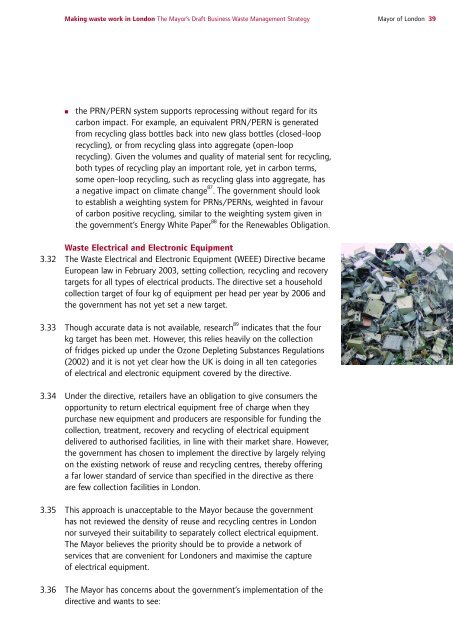Draft Business Waste Strategy PDF - london.gov.uk - Greater ...
Draft Business Waste Strategy PDF - london.gov.uk - Greater ...
Draft Business Waste Strategy PDF - london.gov.uk - Greater ...
You also want an ePaper? Increase the reach of your titles
YUMPU automatically turns print PDFs into web optimized ePapers that Google loves.
Making waste work in London The Mayor’s <strong>Draft</strong> <strong>Business</strong> <strong>Waste</strong> Management <strong>Strategy</strong> Mayor of London 39<br />
■ the PRN/PERN system supports reprocessing without regard for its<br />
carbon impact. For example, an equivalent PRN/PERN is generated<br />
from recycling glass bottles back into new glass bottles (closed-loop<br />
recycling), or from recycling glass into aggregate (open-loop<br />
recycling). Given the volumes and quality of material sent for recycling,<br />
both types of recycling play an important role, yet in carbon terms,<br />
some open-loop recycling, such as recycling glass into aggregate, has<br />
a negative impact on climate change 87 . The <strong>gov</strong>ernment should look<br />
to establish a weighting system for PRNs/PERNs, weighted in favour<br />
of carbon positive recycling, similar to the weighting system given in<br />
the <strong>gov</strong>ernment’s Energy White Paper 88 for the Renewables Obligation.<br />
<strong>Waste</strong> Electrical and Electronic Equipment<br />
3.32 The <strong>Waste</strong> Electrical and Electronic Equipment (WEEE) Directive became<br />
European law in February 2003, setting collection, recycling and recovery<br />
targets for all types of electrical products. The directive set a household<br />
collection target of four kg of equipment per head per year by 2006 and<br />
the <strong>gov</strong>ernment has not yet set a new target.<br />
3.33 Though accurate data is not available, research 89 indicates that the four<br />
kg target has been met. However, this relies heavily on the collection<br />
of fridges picked up under the Ozone Depleting Substances Regulations<br />
(2002) and it is not yet clear how the UK is doing in all ten categories<br />
of electrical and electronic equipment covered by the directive.<br />
3.34 Under the directive, retailers have an obligation to give consumers the<br />
opportunity to return electrical equipment free of charge when they<br />
purchase new equipment and producers are responsible for funding the<br />
collection, treatment, recovery and recycling of electrical equipment<br />
delivered to authorised facilities, in line with their market share. However,<br />
the <strong>gov</strong>ernment has chosen to implement the directive by largely relying<br />
on the existing network of reuse and recycling centres, thereby offering<br />
a far lower standard of service than specified in the directive as there<br />
are few collection facilities in London.<br />
3.35 This approach is unacceptable to the Mayor because the <strong>gov</strong>ernment<br />
has not reviewed the density of reuse and recycling centres in London<br />
nor surveyed their suitability to separately collect electrical equipment.<br />
The Mayor believes the priority should be to provide a network of<br />
services that are convenient for Londoners and maximise the capture<br />
of electrical equipment.<br />
3.36 The Mayor has concerns about the <strong>gov</strong>ernment’s implementation of the<br />
directive and wants to see:
















